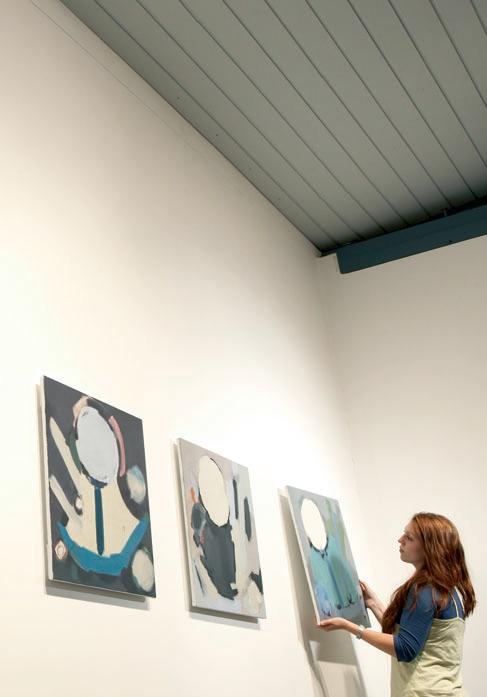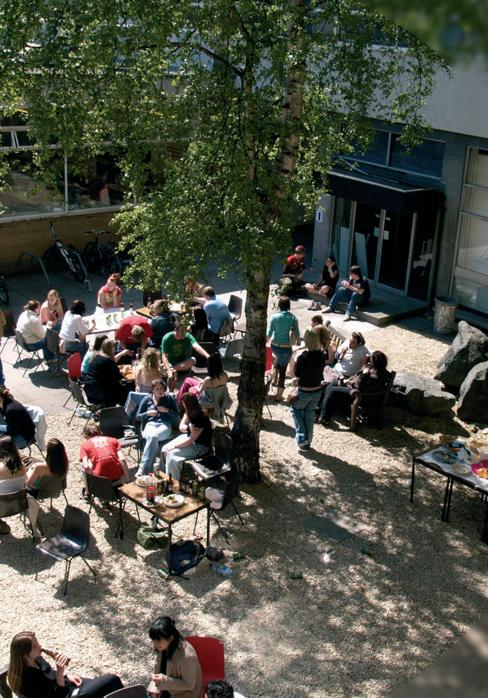
5 minute read
Research at CSAD
RESEARCH AT CARDIFF
The School is host to a wide variety of exciting research into Art & Design. Research is undertaken within Groups and Centres, some of which are described below. Most of the School’s staff are research active, a practice which is actively encouraged partly because of the positive effects on the teaching programme.
Advertisement
THE SENSORY DESIGN RESEARCH GROUP
The Group’s aim is to design, develop and distribute a range of experiential, sensory and educational technologies. Its Reactive Colours project has secured support funding from National Endowment for Science, Technology and the Arts (NESTA) and interest from many organisations including Smart Technologies Limited, Architects of Air, National Autistic Society UK and from Autism Cymru. Recently the group’s leader, Wendy KeayBright was presented with an honorary Autism Cymru S4C Charity of the Year Award in recognition of her work.
TEXTILES RESEARCH GROUP
The many possible ways in which textiles may interface with digital textile practice is being researched by this Group who wish to analyse technology’s impact on creativity and innovation. CENTRE FOR FINE ART RESEARCH The Centre for Fine Art Research provides a medium through which a number of groups with differing interests within the same generic field can interact and collaborate. The Centre’s groups include:
PAINTING RESEARCH GROUP Members of the Group use journeys as inspiration for new workings. Along the way they are creating a ‘museum’ of materials that contextualise and examine their individual thinking in the context of the creative process.
COLLOQUIUM FOR THE STUDY OF WALKING AS A VISUAL PRACTICE RESEARCH GROUP A peer network of international artists is being established by the Colloquium to develop the concept of walking as an art practice.
HISTORY AND THEORY OF ART, DESIGN AND MEDIA GROUP
Promotes original investigation in the fields of the history and theory of art, design and media.
PRINTMAKING RESEARCH GROUP (PROOF) Creates print-based works of art in collaboration with artists such as Ivor Davies, Terry Setch and Mary Lloyd Jones. Mary has worked with the Group extensively over the past two years and is soon to have a major launch of her digital work at the National Library of Wales, the design and production of which has been in collaboration with the PROOF members.
CENTRE FOR RESEARCH IN CERAMICS
This Centre’s wide ranging research includes the preparation of Jeffrey Jones’ book The Studio Potter in Britain due for publication in 2007, the launch of Interpreting Ceramics, a refereed international journal: www.interpretingceramics. com and the Researching Ceramics Online Database: www.researchingceramics. net
THE SOCIAL ROLE OF DESIGN RESEARCH GROUP
This Group sets out to investigate, develop and propose strategies for the social role of design in a wide variety of situations, including design education, especially in lowincome economies. CONFERENCE: CREATIVITY OR CONFORMITY?
In January 2007, CSAD hosted a very successful three day international conference called Creativity or Conformity: Building Cultures of Creativity in Higher Education.
It focused on how the tensions of today’s audit-driven culture with its emphasis on target, is affecting Higher Education when it is widely agreed that students learn best when they are strongly motivated in an open, flexible and creative environment. The conference has provided the impetus for an in-depth study into how best to support this type of teaching.
RESEARCH DEGREE PROGRAMMES
The Cardiff School of Art & Design welcomes research degree applications in the field of Art, Design & Design Technologies.
The School’s research mission focuses on the areas of strategic and applied research within creative practice and research activities reflect the close links that have been created between the School and creative industries, the cultural sector, manufacturing, the professions and the community. Its research is recognised as playing a key role in supporting the economic, social and cultural development in Wales and the UK.
The School provides opportunities to undertake supervised research that lead to the awards of Master of Philosophy (MPhil) (1-2 years full-time, 2 - 5 years part-time) or Doctor of Philosophy (PhD) (3- 4 years full-time, 4 - 7 years part-time). The awards of MPhil and PhD are achieved through a sustained piece of original investigative research and the presentation of a thesis. “Many students successfully secure grants or awards covering tuition fees and maintenance for their research degree studies, most notably from Art & Humanities Research Council (AHRC).”
All research students are given research degree training at Institutional level, which, in addition to preparing you for your studies will allow you the opportunity to meet research students from other disciplines. All candidates for MPhil or PhD are also required to undertake a course in research methods that better equips them to undertake research.
UWIC provides all its research students with expert supervision and facilities relevant to their chosen area of research. Research projects are normally supervised by two members of academic staff, one of whom acts as the candidate's Director of Studies.
APPLICATION AND SELECTION PROCESS
Applications are made directly to UWIC.
For more information email: admissions@uwic.ac.uk or telephone: +44 (0) 29 2041 6044.
Once your application form has been received, it will be sent to Cardiff School of Art & Design for consideration. We will endeavour to process your application as quickly as possible.
The academic staff responsible for your chosen programme will consider carefully the information provided by you on your form and any comments received from your referees. CRITERIA USED IN CONSIDERING YOUR APPLICATION
When we read your application form we are looking for evidence that you would be able to make the most of studying here. For a PhD this will normally mean a Masters qualification, for MPhil it will mean a good undergraduate degree or equivalent. Applicants who wish to study for a PhD but who do not have a Master's degree may register for an MPhil, with the possibility of transfer to PhD, subject to satisfactory completion of a probationary period (usually one year fulltime or two years part-time). Work or other experience can be taken into account as what we will be looking for is sufficient evidence of your ability to sustain independent study at an advanced level.
You should be able to demonstrate a good standard of English, either through a GCSE in English Language or through demonstrable competence in written work.
If you are in any doubt about the relevance of your qualifications or experience, or for any other queries relating to studying for a research degree with us, please contact Clive Cazeaux (ccazeaux@uwic.ac.uk).










